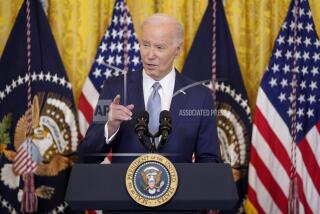Controversial Title 42 border policy vacated by federal judge

A federal judge in Washington on Tuesday vacated a controversial border policy known as Title 42, a public health law invoked by the Trump administration during the pandemic that had allowed border agents to quickly turn back migrants.
The order blocks government officials’ use of a policy that has been criticized by immigrant-rights advocates. It came just days after the Biden administration ousted Chris Magnus, the head of U.S. Customs and Border Protection, who had clashed with Homeland Security Secretary Alejandro N. Mayorkas.
Within hours of the ruling, the Biden administration sought a five-week stay of the order, arguing that it needed time to transition border processing. The government said in its filing that the ACLU, which brought the legal challenge against Title 42, did not oppose the motion.
Since the pandemic began, border agents have used Title 42, a section of the public health code, to rapidly expel would-be immigrants at the border. Previously, thousands of immigrants were able to claim fear of being returned to their home countries in order to gain access to asylum protections in the U.S.
U.S. Judge Emmet Sullivan wrote in his order that it was unreasonable for the government “to assume that it can ignore the consequences of any actions it chooses to take in the pursuit of fulfilling its goals, particularly when those actions included the extraordinary decision to suspend the codified procedural and substantive rights of noncitizens seeking safe harbor.”
“As a practical matter, this ruling does not remotely mean that everyone who arrives at the border will be granted asylum, but it does mean everyone must get a hearing and that’s critical,” said Lee Gelernt, an attorney with the American Civil Liberties Union who argued the case against Title 42.
The White House did not immediately respond to requests for comment. The Department of Homeland Security said in a statement that “the United States will continue to fully enforce our immigration laws at our border,” and acknowledged the Justice Department’s motion for a stay.
“The delay in implementation of the court’s order will allow the government to prepare for an orderly transition to new policies at the border,” the statement continued in part. “But to be clear, under the unopposed motion, Title 42 would remain in place for some period. During the period of this freeze, we will prepare for an orderly transition to new policies at the border. We know that smugglers will lie to try to take advantage of vulnerable migrants, putting lives at risk.”
“We continue to work with countries throughout the Western Hemisphere to take enforcement actions against the smuggling networks that entice migrants to take the dangerous and often deadly journey to our land borders and to address the root causes of irregular migration that are challenging our hemisphere as a whole.”
The ruling lands at a time when the administration is facing sustained political pressure over the rising number of migrants arriving at the border. In the last fiscal year, which ended in September, U.S. Customs and Border Protection recorded more than 2 million encounters with migrants at the border. Some of those apprehensions involved migrants attempting to cross multiple times.
In recent months, an increasing number of border crossers have been asylum seekers from Venezuela, Cuba and Nicaragua. To contend with this, the Biden administration expanded Title 42 by using the policy to turn back Venezuelans to Mexico in October.
Immigrant advocates and legal experts argued that the use of Title 42 was forcing immigrants to try to enter the United States through dangerous and remote areas, rather than official border crossings, as well as pushing them into squalid, precarious living conditions while waiting in Mexico. The group Human Rights First has tracked reports of immigrants who have faced kidnapping and torture in Mexico after being “blocked in or expelled due to Title 42.”
In September 2021, the Biden administration used Title 42 to deport thousands of Haitians from Texas despite criticism from advocates and politicians.
The Biden administration tried to wind down use of the policy in the spring. In the April order that sought to end Title 42, Centers for Disease Control and Prevention Director Rochelle Walensky said the continued use of the policy was unnecessary.
“Although COVID-19 continues to spread within the United States, as a result of the numerous tools for disease prevention, mitigation, and treatment which have become available over the past two years, and the other considerations explained above, an order suspending the right to introduce covered noncitizens under 42 U.S.C. § 265 is no longer required in the interest of public health,” she wrote in the order.
Homeland Security officials at the time said they had been preparing for the end of Title 42 for months and would respond to “irregular migration by strictly but fairly enforcing our immigration laws to process individuals in a safe, orderly, and humane manner, consistent with our laws.”
A federal judge in Louisiana, however, in May ordered the administration to maintain Title 42. It’s unclear whether states such as Arizona and Louisiana, which brought the suit to force the administration to continue Title 42, will respond to the ACLU order with stepped-up legal resistance.
Earlier this fall, in a protest gesture against Biden administration immigration policies, states such as Texas sent buses full of migrants to cities including Washington and New York. On Tuesday, Texas Gov. Greg Abbott tweeted that the ruling was “disastrous” and Rep. Andy Biggs, an Arizona Republican, tweeted that the ruling was “a grave mistake.”
Former Biden officials said the ruling was an opportunity for the administration to unwind the program as it had planned.
“It will allow the administration to move forward on its announcement to end Title 42 once and for all,” said Tyler Moran, a former White House immigration official under the Biden administration who left her role last year.
Tom Jawetz, a former lead Homeland Security attorney in the Biden administration, said Title 42 could not be justified legally as an immigration enforcement measure and was not a tool for an orderly and humane border management system.
“For two years it has provided a way for DHS to quickly turn people back to Mexico or to expel them to certain other countries, but as the CDC recognized in April, there’s no public health rationale supporting its use today,” he said.
Many immigrant rights activists celebrated the ruling, calling it a victory in the fight to dismantle a policy that increases family separations and sends people back to the very dangers they fled without any opportunity for seeking asylum protection.
“Title 42 should never have been implemented — it was a transparent attempt to close the border to asylum seekers using the pretext of the pandemic as justification,” Jennifer Nagda, policy director at the Young Center for Immigrant Children’s Rights.
“Today’s ruling from Judge Sullivan calls out that lie and is a critical step to return to the rule of law, one carelessly tossed aside for nearly three years,” she added.
But some of the same organizations praising the ruling criticized the Biden administration’s move to ask for a stay of five weeks.
“Today’s order gives the administration the green light to end Title 42 once and for all — as it said it intended to last spring. There’s no justification for the administration extending the life of Title 42 by seeking a stay of today’s order,” said Monika Langarica, an attorney with the Center for Immigration Law and Policy at UCLA. “Each day that passes with Title 42 in place is one more day that countless lives are endangered by this policy.”
More to Read
Sign up for Essential California
The most important California stories and recommendations in your inbox every morning.
You may occasionally receive promotional content from the Los Angeles Times.












